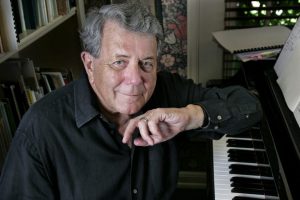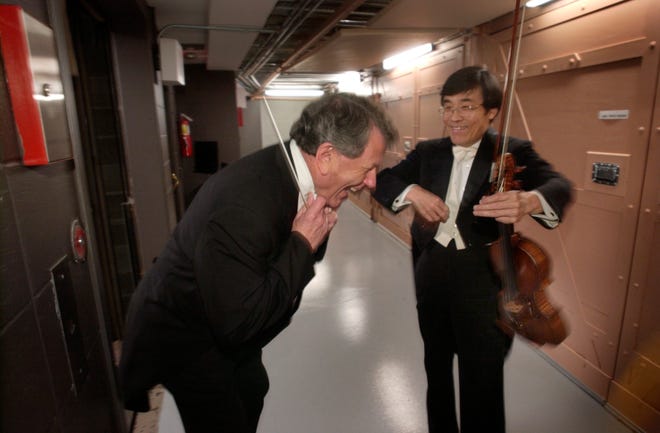
Photo info ...
Credit: Frank Espich/IndyStar, Indianapolis Star via Imagn Content Services, LLCView Source
(Aug. 11, 1927–Oct. 22, 2019). John Raymond Leppard was born in London and grew up in Bath, Somerset, 97 miles west of the city. He attended the City of Bath Boys’ School and studied harpsichord and viola at Trinity College, Cambridge, where he became interested in choral conducting.
Leppard debuted as a conductor in 1952 with his own Leppard Ensemble. He was associated with what became the English Chamber Orchestra, gave recitals as a harpsichordist, and was a fellow and lecturer in music from 1958-1968 at Trinity College. He eventually became director of music at Trinity before retiring in 1968.
Leppard’s interest in early music proved instrumental to the realization of operatic scores from that period. Early operas were produced from a score containing just vocal parts and figured bass (a specific notation with numbers below bass notes in the lower staff that represent chords made above the bass notes). Leppard created accompanying music from the figured bass, either improvisationally in real time or as a detained exercise in writing. A lost art, the revival of realization in the 20th century by scholar-performers like Leppard proved significant to introducing the general public to operatic masterpieces. Leppard is noted for his realizations of Monteverdi’s L’incoronazione di Poppea, L’Orfeo, and Il ritorno d’Ulisse in Patria.

Leppard made his American debut in November 1969, when he conducted the Westminster Choir and the New York Philharmonic. Other conducting commissions included work with the opera houses in San Francisco, Los Angeles, and Santa Fe.
Indianapolis first approached Leppard to conduct the in 1982. Leppard balked at the offer, noting his disdain for where the ISO was then playing. The concrete, square box theatre felt chilly, cold, and unappealing to him. However, the orchestra members he had met during his visit to the city left an indelible impression on him. Leppard was the frequent guest conductor at the Chicago Symphony Orchestra (CSO) but felt the ISO string sound was fundamentally more beautiful and malleable than that of the CSO members. Though smitten with the string section it was not enough to pull Leppard away from Chicago.
In 1984, after purchased the and spent roughly $7 million to refurbish it, Leppard reconsidered the proposition he had been offered in 1982. Robert Jones, the orchestra’s executive director was fundamental in wooing Leppard to Indianapolis. Jones asked Leppard to come back to guest conduct some concerts in the new venue, the acoustics of which Leppard found staggeringly perfect. With that, Leppard settled to a grand experiment to turn the ISO into one of the great classical orchestras in the Midwest.
Conductor Laureate Raymond Leppard served as music director of the ISO for 14 years, from 1987 to 2001. During that time, he conducted eight recordings, led two tours to Europe, and initiated Indianapolis On-The-Air, a nationally syndicated radio broadcast of ISO performances that aired on more than 250 stations. In addition to his tenure with the ISO and long association with the English Chamber Orchestra, Leppard appeared with the New York Philharmonic and toured with the Chicago and Detroit symphonies. He conducted many major orchestras around the world and appeared at multiple renowned opera houses.
A prolific recording artist, Raymond Leppard earned such international prizes as the Deutsche Schallplattenpreis, a Grammy® Award, a Grand Pro/Am Music Prix du Disque, and the Edison Prize. Leppard composed several film scores including the music for Lord of the Flies (1963), Alfred the Great (1969), Laughter in the Dark (1969), and The Hotel New Hampshire (1984). The Queen of England honored Raymond Leppard with the title Commander of the British Empire. For his services to Italian music, the Republic of Italy conferred upon him the title of Commendatore della Republica Italiana. In America, he received honorary degrees from Purdue University, Butler University, and the University of Indianapolis. Born in London, Raymond Leppard was educated at Trinity College, Cambridge. He became a U.S. citizen in 2003.

Help improve this entry
Contribute information, offer corrections, suggest images.
You can also recommend new entries related to this topic.